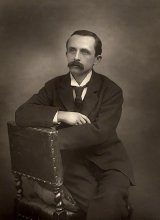Peter Pan Page #6
Peter Pan; or, the Boy Who Wouldn't Grow Up or Peter and Wendy is J. M. Barrie's most famous work, in the form of a 1904 play and a 1911 novel.
Peter could be exceeding polite also, having learned the grand manner at fairy ceremonies, and he rose and bowed to her beautifully. She was much pleased, and bowed beautifully to him from the bed. “What's your name?” he asked. “Wendy Moira Angela Darling,” she replied with some satisfaction. “What is your name?” “Peter Pan.” She was already sure that he must be Peter, but it did seem a comparatively short name. “Is that all?” “Yes,” he said rather sharply. He felt for the first time that it was a shortish name. “I'm so sorry,” said Wendy Moira Angela. “It doesn't matter,” Peter gulped. She asked where he lived. “Second to the right,” said Peter, “and then straight on till morning.” “What a funny address!” Peter had a sinking. For the first time he felt that perhaps it was a funny address. “No, it isn't,” he said. “I mean,” Wendy said nicely, remembering that she was hostess, “is that what they put on the letters?” He wished she had not mentioned letters. “Don't get any letters,” he said contemptuously. “But your mother gets letters?” “Don't have a mother,” he said. Not only had he no mother, but he had not the slightest desire to have one. He thought them very over-rated persons. Wendy, however, felt at once that she was in the presence of a tragedy. “O Peter, no wonder you were crying,” she said, and got out of bed and ran to him. “I wasn't crying about mothers,” he said rather indignantly. “I was crying because I can't get my shadow to stick on. Besides, I wasn't crying.” “It has come off?” “Yes.” Then Wendy saw the shadow on the floor, looking so draggled, and she was frightfully sorry for Peter. “How awful!” she said, but she could not help smiling when she saw that he had been trying to stick it on with soap. How exactly like a boy! Fortunately she knew at once what to do. “It must be sewn on,” she said, just a little patronisingly. “What's sewn?” he asked. “You're dreadfully ignorant.” “No, I'm not.” But she was exulting in his ignorance. “I shall sew it on for you, my little man,” she said, though he was tall as herself, and she got out her housewife [sewing bag], and sewed the shadow on to Peter's foot. “I daresay it will hurt a little,” she warned him. “Oh, I shan't cry,” said Peter, who was already of the opinion that he had never cried in his life. And he clenched his teeth and did not cry, and soon his shadow was behaving properly, though still a little creased. “Perhaps I should have ironed it,” Wendy said thoughtfully, but Peter, boylike, was indifferent to appearances, and he was now jumping about in the wildest glee. Alas, he had already forgotten that he owed his bliss to Wendy. He thought he had attached the shadow himself. “How clever I am!” he crowed rapturously, “oh, the cleverness of me!” It is humiliating to have to confess that this conceit of Peter was one of his most fascinating qualities. To put it with brutal frankness, there never was a cockier boy. But for the moment Wendy was shocked. “You conceit [braggart],” she exclaimed, with frightful sarcasm; “of course I did nothing!” “You did a little,” Peter said carelessly, and continued to dance. “A little!” she replied with hauteur [pride]; “if I am no use I can at least withdraw,” and she sprang in the most dignified way into bed and covered her face with the blankets. To induce her to look up he pretended to be going away, and when this failed he sat on the end of the bed and tapped her gently with his foot. “Wendy,” he said, “don't withdraw. I can't help crowing, Wendy, when I'm pleased with myself.” Still she would not look up, though she was listening eagerly. “Wendy,” he continued, in a voice that no woman has ever yet been able to resist, “Wendy, one girl is more use than twenty boys.” Now Wendy was every inch a woman, though there were not very many inches, and she peeped out of the bed-clothes. “Do you really think so, Peter?” “Yes, I do.” “I think it's perfectly sweet of you,” she declared, “and I'll get up again,” and she sat with him on the side of the bed. She also said she would give him a kiss if he liked, but Peter did not know what she meant, and he held out his hand expectantly. “Surely you know what a kiss is?” she asked, aghast. “I shall know when you give it to me,” he replied stiffly, and not to hurt his feeling she gave him a thimble. “Now,” said he, “shall I give you a kiss?” and she replied with a slight primness, “If you please.” She made herself rather cheap by inclining her face toward him, but he merely dropped an acorn button into her hand, so she slowly returned her face to where it had been before, and said nicely that she would wear his kiss on the chain around her neck. It was lucky that she did put it on that chain, for it was afterwards to save her life. When people in our set are introduced, it is customary for them to ask each other's age, and so Wendy, who always liked to do the correct thing, asked Peter how old he was. It was not really a happy question to ask him; it was like an examination paper that asks grammar, when what you want to be asked is Kings of England. “I don't know,” he replied uneasily, “but I am quite young.” He really knew nothing about it, he had merely suspicions, but he said at a venture, “Wendy, I ran away the day I was born.” Wendy was quite surprised, but interested; and she indicated in the charming drawing-room manner, by a touch on her night-gown, that he could sit nearer her. “It was because I heard father and mother,” he explained in a low voice, “talking about what I was to be when I became a man.” He was extraordinarily agitated now. “I don't want ever to be a man,” he said with passion. “I want always to be a little boy and to have fun. So I ran away to Kensington Gardens and lived a long long time among the fairies.” She gave him a look of the most intense admiration, and he thought it was because he had run away, but it was really because he knew fairies. Wendy had lived such a home life that to know fairies struck her as quite delightful. She poured out questions about them, to his surprise, for they were rather a nuisance to him, getting in his way and so on, and indeed he sometimes had to give them a hiding [spanking]. Still, he liked them on the whole, and he told her about the beginning of fairies. “You see, Wendy, when the first baby laughed for the first time, its laugh broke into a thousand pieces, and they all went skipping about, and that was the beginning of fairies.” Tedious talk this, but being a stay-at-home she liked it. “And so,” he went on good-naturedly, “there ought to be one fairy for every boy and girl.” “Ought to be? Isn't there?” “No. You see children know such a lot now, they soon don't believe in fairies, and every time a child says, 'I don't believe in fairies,' there is a fairy somewhere that falls down dead.” Really, he thought they had now talked enough about fairies, and it struck him that Tinker Bell was keeping very quiet. “I can't think where she has gone to,” he said, rising, and he called Tink by name. Wendy's heart went flutter with a sudden thrill.
Translation
Translate and read this book in other languages:
Select another language:
- - Select -
- 简体中文 (Chinese - Simplified)
- 繁體中文 (Chinese - Traditional)
- Español (Spanish)
- Esperanto (Esperanto)
- 日本語 (Japanese)
- Português (Portuguese)
- Deutsch (German)
- العربية (Arabic)
- Français (French)
- Русский (Russian)
- ಕನ್ನಡ (Kannada)
- 한국어 (Korean)
- עברית (Hebrew)
- Gaeilge (Irish)
- Українська (Ukrainian)
- اردو (Urdu)
- Magyar (Hungarian)
- मानक हिन्दी (Hindi)
- Indonesia (Indonesian)
- Italiano (Italian)
- தமிழ் (Tamil)
- Türkçe (Turkish)
- తెలుగు (Telugu)
- ภาษาไทย (Thai)
- Tiếng Việt (Vietnamese)
- Čeština (Czech)
- Polski (Polish)
- Bahasa Indonesia (Indonesian)
- Românește (Romanian)
- Nederlands (Dutch)
- Ελληνικά (Greek)
- Latinum (Latin)
- Svenska (Swedish)
- Dansk (Danish)
- Suomi (Finnish)
- فارسی (Persian)
- ייִדיש (Yiddish)
- հայերեն (Armenian)
- Norsk (Norwegian)
- English (English)
Citation
Use the citation below to add this book to your bibliography:
Style:MLAChicagoAPA
"Peter Pan Books." Literature.com. STANDS4 LLC, 2024. Web. 24 Nov. 2024. <https://www.literature.com/book/peter_pan_12>.




Discuss this Peter Pan book with the community:
Report Comment
We're doing our best to make sure our content is useful, accurate and safe.
If by any chance you spot an inappropriate comment while navigating through our website please use this form to let us know, and we'll take care of it shortly.
Attachment
You need to be logged in to favorite.
Log In